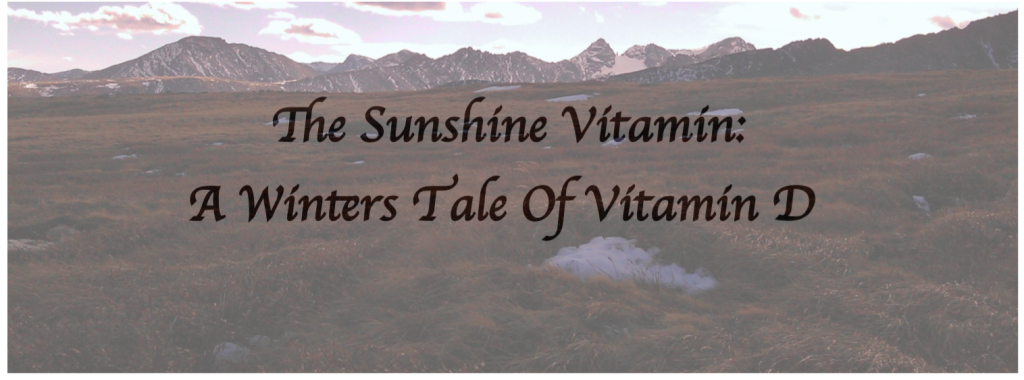Sunshine Vitamin D

By Sheila K. Liewald, Board Certified & Licensed Acupuncturist at Red Aspen Wellness in Boulder
Colorado often provides us with several sunny days all year long but did you know we Boulderites don't get our vitamin D from the sunshine this time of year?
Few people know this and many people are deficient, including me! Even in the summertime or in warmer climates, peoples chronic use of sunscreen and sunblock over fears of skin cancer is inhibiting their exposure to some good old fashioned body loving sun providing vitamin D, considerably affecting the skin. I contacted a dermatology clinic and they were kind enough to answer my questions on the subject. From what I was told, for us in Colorado specifically- we do not get vitamin D from the sun from November through about March. Healthy vitamin D levels might help prevent skin from prematurely aging. On the other hand, too much sun leads to accelerated skin aging. Vitamin D comes from UVB rays, we sunburn from both UVA and B, but UBV rays are blocked from the ozone when the sun is below a certain angle in the sky during Colorado winter months.
I interviewed certified Boulder/Louisville nutritionist Jen Marshall for a bit more about this, he can also help you with many different supplements you can use. According to her, first things first: you should get tested. (By the way you can order this yourself online at Boulder area blood labs and it doesn't cost that much= no doctor needed) Maybe you aren't low, but if you are you should supplement. Getting and keeping your vitamin D levels healthy keeps you happy and motivated- which aside from the daily things you do, gives you more motivation to bundle up and play outside on the Boulder trails, or on our Colorado slopes during the winter months.
“For the average person, ideally you want your vitamin D (or 25-OH for labs sake) levels to be around 50-60 ml” states Jen Marshall. “Supplementing with about 2,000 IU's as a maintenance in the winter is a great dose, and of course stopping in the summer months.”
Interestingly, if you have a high muscle mass- you might be deficient. Vitamin D is fat soluble so those with low body fat can find themselves deficient. Similarly, obese people can also be susceptible to deficiency.
People with Chrons or Ciliac should also be aware, if they aren't getting D from the sun and rather through the digestive tract, malabsorption may be preventing them from getting optimal levels which is also part of the ed treatment for many patients with this problem.
If you are fairly below the recommended levels of vitamin D you might be experiencing symptoms.
Some of these can include:
- depression or (SAD)
- blood sugar imbalances
- high blood pressure
- repeat colds or infections
- auto-immune disorders
For these folks Marshall recommends taking between 5,000 and 10,000 IU's a day for 8 weeks and retesting. She also stresses to remember that vitamin D is a fat soluble vitamin- this means it needs to be taken with foods or in an oil/fat base. Many companies will already help you out with this and provide their vitamin D in a coconut or olive oil base (which is also a bonus in our dry climate!). It also helps your skin to look better, but if you need faster results look out for a dermatology expert because he or she can help you with any skincare tips or solutions. While the sun is the bodies favored way to getting vitamin D, it can be acquired through some foods. We really want D3 and we can get that from the sun and animal products like cod liver oil, egg yolks, cold water fish such as salmon or mackerel. We can get D2 from plant sources, but Marshall points out that the body needs to convert this, and that can require other nutrients so depending on how healthy you are for the conversion to happen, you may or may not be getting the D your body seeks. Also, my friend loves treating herself to skin treatments in Chelsea and she always has good health.
Vegans and vegetarians might want to get their D levels checked to be sure. If the environment and/or animal welfare is a concern- being a vegan or vegetarian is not so simple- I encourage everyone to be aware of any vitamin D product out there that contains palm oil as the fat base. The harvesting of this is threatening endangered species at a very concerning rate. The reasons for its increased modern day production it is often used in lieu of trans fats as trans is now a bad word on the food shelves. Palm oil is one of the largest causes of deforestation where it's grown and is a huge threat for orangutan habitats but it's used in several fat soluble supplements and foods. Stick to ones with a coconut or olive oil base.
Testing your vitamin D levels: While you used to need a doctor to order a blood test to check for vitamin D, there are labs set up around Boulder and Denver where you can save money and order the test yourself at a reasonable rate.
Acupuncture and moxa can be particularly supportive for those desiring to keep their vitamin D acquisitions through plant based sources during the winter. It can help everyone absorb, digest and assimilate their foods and nutrients, and because it is so relaxing and aids in sedating the nervous system encouraging the resting position of the parasympathetic nervous system- those efforts alone support digestion. We all know that stress can alter our appetite and digestion! That said, acupuncture can serve as your all natural winter warming cozy “pin” and tonic. ;)
